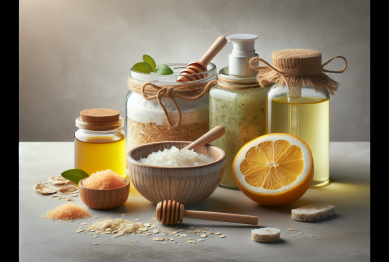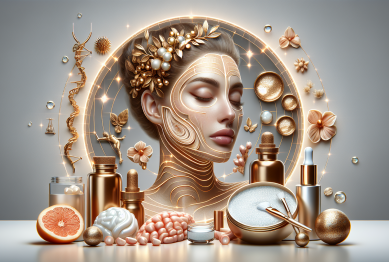Curious about collagen and its role in glowing skin? Explore how this natural protein supports skin health, visible aging, and wellness. Learn about proven ways people enhance collagen in their routine, what science says, and discover useful insights drawn from reputable health and beauty sources.
The Science Behind Collagen and Radiant Skin
Collagen is one of the most talked-about proteins in the wellness and beauty field. For those interested in slowing the visible signs of aging or improving skin elasticity, collagen is a natural focus. Collagen acts as a structural support for the skin, creating a firm and resilient look. However, the body’s ability to produce collagen declines gradually starting in the mid-20s, leading to fine lines and changes in skin texture over time. While it’s common to see promotions for supplements or injectable options, established experts say natural collagen renewal is influenced by nutrition, sleep, environmental stress, and general wellness. Being aware of how this protein works can shape the way one approaches skincare for a more radiant complexion (https://www.niams.nih.gov/health-topics/collagen).
Environmental factors play a significant role in collagen health. Exposure to sun, cigarette smoke, and pollution can speed up collagen breakdown, making preventive care crucial. Dermatologists often recommend daily sunscreen and antioxidant-rich skincare as steps to help limit damage. Adding a diet that includes leafy greens, fish, and foods with vitamin C is thought to have positive effects. Many people also explore collagen peptides in powders and drinks, which are readily absorbed and widely available. While scientific consensus on supplement effectiveness is still growing, some studies have shown promise in relation to skin hydration and elasticity (https://www.ncbi.nlm.nih.gov/pmc/articles/PMC8824542/).
One fascinating area is how daily routines impact skin’s collagen levels. Stress management, balanced sleep schedules, and regular movement all appear to play a role. Research continues to investigate which wellness habits have the strongest influence on the skin’s underlying matrix. Skin professionals frequently encourage a holistic approach, where internal health meets external practices. Exploring the science behind collagen not only reveals new strategies for beauty enthusiasts, but also empowers readers to better understand the mechanisms that keep skin looking its best for years to come.
How Collagen Influences Aging and Wellness
Visible skin aging has deep roots in collagen dynamics. People often notice changes such as fine lines, sagging, and dryness as the skin loses collagen. These changes are a natural part of life, but wellness seekers are increasingly focused on strategies that support collagen integrity. Modern research suggests that hydration, plant-based diets, and sleep hygiene can subtly support overall collagen function. Collagen-rich bone broths or marine collagen supplements have also become popular topics in beauty circles, reinforcing the idea that everyday routines matter (https://www.hsph.harvard.edu/nutritionsource/collagen/).
Beyond external appearance, collagen supports wellness throughout the body. Collagen provides structure to bones, joints, and even the cardiovascular system. Wellness experts are starting to look at collagen as more than a beauty supplement; it’s part of an overall well-being strategy. While the most visible benefits may show in youthful skin, joint mobility and gut lining health are influenced as well. This turns collagen into a cross-category focus, spanning beauty, fitness, and preventive wellness conversations.
Healthy collagen turnover is influenced by more than just topical treatments or single ingredients. Instead, it’s an interplay of genetics, hormone levels, diet, and environmental exposures that shapes one’s skin journey. This interconnectedness emphasizes why comprehensive daily practices, not just quick fixes, matter for lasting results. Staying informed about the latest science allows people to personalize their approach to aging, choosing methods that align with their goals and values.
Nutrition and Lifestyle Tips That Support Collagen
Nutrition is a key focus in beauty and wellness discussions about collagen. Protein-rich foods like fish, chicken, legumes, and eggs provide the necessary amino acids for collagen synthesis. Vitamin C, found in citrus fruits and leafy greens, plays an essential supporting role. Minerals like zinc and copper are also necessary, highlighting the role of a balanced diet in skin health. Many experts recommend limiting processed sugar intake, as excessive sugar can interfere with collagen’s ability to repair and renew (https://www.ncbi.nlm.nih.gov/pmc/articles/PMC9077212/).
Lifestyle habits—both positive and negative—affect collagen. Regular exercise improves blood flow and nutrient delivery, which benefits the skin’s building blocks. On the other hand, smoking, excessive sunbathing, and chronic sleep deprivation accelerate collagen breakdown. Setting up straightforward habits like practicing sun protection and keeping stress in check support the skin from within. Simple routines, repeated over time, often make the biggest difference in support of natural collagen status.
People sometimes ask if collagen peptides or hydrolyzed collagen products really work. Scientific reviews suggest they can improve skin elasticity and hydration in certain groups, though results vary by individual and the source of supplementation. Including them as part of a balanced nutrition plan rather than a replacement can be an effective way to explore their benefits. Consulting with health professionals can ensure these strategies fit each unique situation and are used alongside other wellness goals (https://ods.od.nih.gov/factsheets/Collagen-Consumer/).
Understanding Collagen-Boosting Skincare Routines
Modern skincare puts collagen front and center in many product descriptions. Ingredients like retinol, peptides, and vitamin C serums aim to influence collagen production in the skin. While topical solutions alone may not dramatically reverse aging, they can help protect existing collagen when combined with SPF and moisturizing habits. A mix of night creams, day lotions, and periodic exfoliation supports the skin’s renewal process. Those exploring skincare routines often find that gentle, consistent care helps skin look refreshed (https://www.aad.org/public/diseases/a-z/anti-aging-skin-care).
Certain non-invasive procedures like microneedling and light-based therapies are also gaining traction. These methods encourage the skin to repair itself by stimulating collagen synthesis. Though professional guidance is crucial, these options are an example of how technology and science blend with beauty. Anyone interested in these treatments should research safety, benefits, and costs with a board-certified skin specialist for optimal outcomes.
The effectiveness of collagen-focused skincare varies by person. Genetics, current skin condition, and lifestyle habits all play roles. Finding a routine that fits these factors reduces the risk of irritation and increases satisfaction. Skin health is a journey, and building daily practices may be more rewarding than rapid transformations. Regular check-ins with skincare professionals can help adjust routines as skin changes with time and environment.
Collagen Myths and Evidence-Based Facts
The beauty market is filled with bold claims about collagen. Some suggest that any collagen supplement will restore youthful skin overnight, yet evidence-based reviews urge caution. Genuine improvements often come from habits that protect and nourish the body over time. Peer-reviewed studies suggest specific benefits, but dramatic promises are rarely supported by science (https://www.ncbi.nlm.nih.gov/pmc/articles/PMC8824542/).
One common myth is that topical collagen can directly replace lost dermal collagen. While these creams can add moisture and temporarily smooth skin, collagen molecules are typically too large to penetrate the lower skin layers. Only certain compounds, like peptides and retinoids, have been shown to influence real collagen synthesis. Separating myth from reality enables smarter choices for those building wellness and beauty routines.
Collagen is not a miracle cure, but it is a foundational element in visible wellness and beauty. Clear expectations—supported by evidence—help people choose methods likely to align with their needs. Whether someone seeks gentle aging, stronger hair and nails, or total-body health, focusing on collagen within a broad and personalized strategy brings lasting benefits over time.
Emerging Trends in Collagen for Wellness and Beauty
New research on collagen is emerging rapidly. Innovations include plant-based collagen boosters for those following vegan or vegetarian diets. Fermented skincare, adaptogens, and advanced peptide blends appear in new wellness products, appealing to those seeking the latest in holistic beauty science. Many turn to wearable technology apps that measure skin hydration and environmental exposure, supporting continuous learning and improvement (https://www.healthline.com/health/beauty-skin-care/collagen-supplements).
Some forward-thinking brands focus on environmentally responsible sourcing, offering marine or plant-collagen alternatives that appeal to eco-conscious users. Beauty insiders expect continued growth in personalized recommendations based on genomic data and real-time skin analysis. Community wellness platforms now share practical tips, success stories, and research reviews—making science-backed decisions more accessible to everyone.
Staying current with the science and trends helps shape realistic expectations and daily routines. Innovations like ingestible skincare, multi-action serums, and “inside-out” wellness blends reflect a shift toward holistic, evidence-based approaches. As these trends continue, those interested in collagen for wellness and beauty have more resources to personalize their path, reflect their values, and discover what truly works for them.
References
1. National Institute of Arthritis and Musculoskeletal and Skin Diseases. (2022). Collagen. Retrieved from https://www.niams.nih.gov/health-topics/collagen
2. Harvard T.H. Chan School of Public Health. (2023). Collagen. Retrieved from https://www.hsph.harvard.edu/nutritionsource/collagen/
3. Office of Dietary Supplements, National Institutes of Health. (2022). Collagen. Retrieved from https://ods.od.nih.gov/factsheets/Collagen-Consumer/
4. American Academy of Dermatology Association. (2023). Skin Care and Aging. Retrieved from https://www.aad.org/public/diseases/a-z/anti-aging-skin-care
5. Healthline. (2022). Collagen Supplements: Benefits, Side Effects, and More. Retrieved from https://www.healthline.com/health/beauty-skin-care/collagen-supplements
6. Choi, F. D., Sung, C. T., & Juhasz, M. L. (2019). Oral collagen supplements: A systematic review of dermatological applications. Journal of Drugs in Dermatology, 18(1), 9-16. Retrieved from https://www.ncbi.nlm.nih.gov/pmc/articles/PMC8824542/









